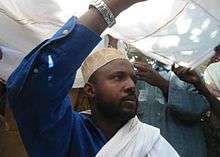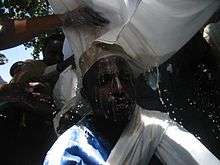Jama Garad Ali
Garad Jama Garad Ali (Somali: Garaad Jaamac Garaad Cali) is a Somali King. He is the senior Garaad of the traditional Dhulbahante chiefs. [1]
Garaad Jaamac Garaad Cali
Garaad Jaamac was crowned in Las Anod City in front of a huge number of people including high-ranking politicians from Somali Transitional Government, Somaliland and Puntland. The event brought together, for the first time after the collapse of Somali Government in 1991, a large number of politically diverse politicians such as former Somali Prime Minister Ali Khalif Galaydh, the President and the Vice-President of Puntland, and the 2nd Deputy Speaker of the Somaliland House of Representatives. Though the tension was high, the coronation of one of the most senior and powerful traditional leaders of Somalia proceeded peacefully.[2]
The Coronation
The coronation took place May 22, 2006, in Geedo-Qarsay Valley, near Las Anod, where Garad Jama's father (Garad Ali aka Ali Garad jama), his uncle (Garad Abdiqani Garad Jama), and his grandfather (Garad Jama) were crowned. The Las-Anoders showed their well-known hospitality to the thousands of guests who attended "the once of a lifetime" ceremony. The audiences were entertained with well-trained horses that were decorated by damasks and embroidery, which manifested the traditional craftsmen and women's hard work based on the rich Somali cultural heritage.
At 10 o'clock the milk was poured into the Garad. Milk is a symbol of peace and eternal prosperity; this act is true to the equilibrium of the virtues of the traditional culture.


Reconciliation and rebuilding Somalia
The last two decades, Somalia was in anarchy. Government services ceased especially judiciary, law, order and social services. In that lawless state, Somali people turn to their traditional leaders and traditional system for mending the peace and social harmony. Although, the traditional leaders were unprepared to shoulder all the problems created by the chaos, still practicing traditional ways decreased conflicts between clans especially parts of the country where traditional system practiced. Traditional leaders also succeeded creating local administration that extends social services to the community. he last two decades, Somalia was in anarchy. Government services ceased especially judiciary, law, order and social services. In that lawless state, Somali people turn to their traditional leaders and traditional system for mending the peace and social harmony. Although, the traditional leaders were unprepared to shoulder all the problems created by the chaos, still practicing traditional ways decreased conflicts between clans especially parts of the country where traditional system practiced. Traditional leaders also succeeded creating local administration that extends social services to the community. traditional leaders worked tirelessly restoring the dignity and state of their people, at last the wish of the elders came true when 135 traditional leaders met Mogadishu May 18, 2012.[3] Garad Jama was one of the 135 traditional leaders attended that meeting and the elders elected him for the chairman of the elders arbitration committee. [4]
Dhulbahante Garads
- Garad Jama II
- Garad AbdiQani (Garad Jama's uncle) 1985-2006[5]
- Garad Ali V 1966-1985 [6]
- Garad Jama I 1923-1966 [7]
- Garad Aar Dheel (Regent) 1921-1923 (Garad Aar Dheel was the closest relative to the Garad Family so he took was a regent Garad since the Royal family wasn't present in the Nogal Valley)
- Garad Mohamed IV 1901-1918
- Garad Ali IV 1863-1899 (Assassinated during the Dervish wars)
- Garad Mohamud IV (koore-baas) warrior Garad[8]
- Garad Ali III
- Garad Mohamed III
- Garad Ali II
- Garad Mohamud III
- Garad Mohamed II
- Garad Mohamud II
- Garad Ali I
- Garad Mohamud (Jabane) I
- Garad Mohamed I
- Garad Yasin (Abdalla's brother)
- Garad Abdalla II
- Garad Farah
- Garad Shirshoore
- Garad Yahya (Habarwa's brother)
- Garad Habarwaa
- Garad Abdalla I
- Garad Muusa
- Garaad Hayaag
- Garaad Said
- Garad Yahya (Habarwa's brother)
- Garad Shirshoore
- Garad Farah
- Garad Abdalla II
- Garad Yasin (Abdalla's brother)
- Garad Mohamed I
- Garad Mohamud (Jabane) I
- Garad Ali I
- Garad Mohamud II
- Garad Mohamed II
- Garad Mohamud III
- Garad Ali II
- Garad Mohamed III
- Garad Ali III
- Garad Mohamud IV (koore-baas) warrior Garad[8]
- Garad Ali IV 1863-1899 (Assassinated during the Dervish wars)
- Garad Mohamed IV 1901-1918
- Garad Aar Dheel (Regent) 1921-1923 (Garad Aar Dheel was the closest relative to the Garad Family so he took was a regent Garad since the Royal family wasn't present in the Nogal Valley)
- Garad Jama I 1923-1966 [7]
- Garad Ali V 1966-1985 [6]
- Garad AbdiQani (Garad Jama's uncle) 1985-2006[5]
See also
References
- ↑ http://www.garoweonline.com/artman2/publish/Somalia_27/50_000_civilians_flee_conflict_in_Somalia_s_north_UN_official_printer.shtml
- ↑ http://www.somalilandpatriots.com/print-579-0
- ↑ http://www.somaliareport.com/rss.xml
- ↑ http://sabahionline.com/en_GB/articles/hoa/articles/newsbriefs/2012/08/14/newsbrief-03
- ↑ PEACE IN SOMALILAND: An Indigenous Approach to State-Building Burao, Borama, and Sanaag Conferences. In one of the most significant early examples of such an approach, the Dhulbahante’s Garaad Abdiqani initiated talks in the Ethiopian towns of Qararro, Danood, Gashaamo and Gowlalaale in February 19909 with representatives of the Habar Je’lo clan of the Isaaq. A similar conference took place in August of the same year in Gashaamo with the Habar Yoonis.
- ↑ Political parties and national integration in tropical Africa By jr Rosberg (Carl G.), James S. Coleman page 544. Ali Garad Jama, university educated son of Gerad (Chief) Jama was the main drive behind the USP party formed 1958 in the Dariod center of Lasanod.
- ↑ Political parties and national integration in tropical Africa By jr Rosberg (Carl G.), James S. Coleman page 545. Gerad jama, Traditional Chief of Bah Arasame Dhulbahante, with authority over the most numerous of Dhulbahante subclans, the Farah Garad, supported the SYL as a protest against the government's local authority system.
- ↑ Diary and Observations Made by Lieutenant Speke, When Attempting to Reach the Wady Nogal|He has, however, been successfully opposed by Mahmud Ali, the rightful chief of the Dulbahanta family; the southern clans of Haud and beyond the Nogal being more numerous and more powerful than the northern divisions.
External links
| Wikimedia Commons has media related to Jama Garad Ali. |
- Caleema-saarkii Garaadka by the famous Somali writer Axmed F. Cali Idaajaa, one of the notable figures who attended the coronation ceremony.
- Laascaanood: Ray of Hope by Ubax Abdikariim (May 24, 2006)
- Revisiting_Somali_Cultture_With_Garaad_Jaamac by Faisal A Roble